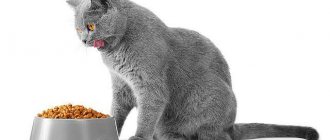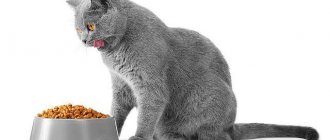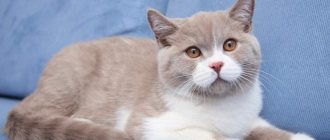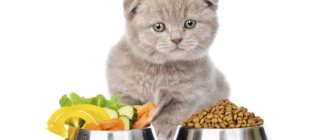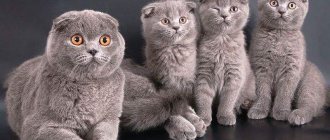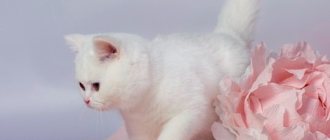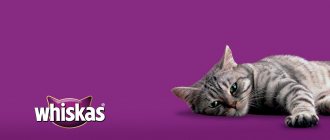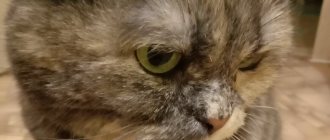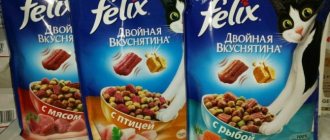British is an artificially bred breed. Not all foods that are fed to barn cats are suitable for her. The health and longevity of the pet depends on how responsibly the owner approaches the preparation of the diet. And for kittens, proper nutrition is doubly important. Therefore, when it comes to feeding, recommendations from veterinarians and experienced breeders of British cats will not hurt.
Choosing a place and utensils for feeding
A British cat should have a separate place for eating. Important terms:
- safety;
- comfort;
- privacy;
- availability.
You should not feed your Briton in a hallway where people often walk, or in a room with a TV constantly on. Extraneous noise will distract the cat.
For your information. If there is already a pet in the apartment, it is better to feed the kitten separately at first. Otherwise, the older pet may take the food away from him.
British cats are best fed from deep stainless steel or ceramic bowls. The dish should be wide enough so that the mustache does not rest against the sides. After each feeding, the bowls are washed, and the area where the cat ate is wiped with a damp cloth. You can put oilcloth or a rubber mat there - this will greatly simplify cleaning.
Natural diet
Many owners prefer to feed their British cat natural food at home. It is believed that this is the most physiological type of nutrition. Cats are carnivores by nature, so their diet must include meat and other products that are available to animals in the wild.
What foods should be given?
The basis of the diet (60-70%) of British shorthair and longhair cats is made up of lean meats - beef, chicken, turkey. Lamb, pork, geese and duck meat are too fatty, so they should not be fed to pets.
About 2 times a week the menu includes offal:
- boiled liver;
- heart;
- kidneys;
- lungs;
- language;
- chicken stomachs.
They provide the body with amino acids and add variety to the daily menu.
Another important component of the diet (25-30%) is vegetables, fruits and herbs. These are sources of vitamins, minerals and dietary fiber.
It is useful to feed British cats:
- carrots;
- cucumbers;
- asparagus;
- pumpkin;
- zucchini;
- apples;
- apricots;
- sprouted oats;
- lettuce leaves;
- dill
Vegetables and herbs are given in the form of salads or mixed into meat. Fruits can act as treats.
Once every 3-4 days, British cats are fed boiled sea fish. It must be cleaned of bones and scales.
At home, British cats are also fed fermented milk products: low-fat kefir, cottage cheese, curdled milk, natural yogurt. Once a week they pamper you with grated cheese.
Important. Only kittens can be given milk. It is usually not absorbed by adult cats.
To provide your pet with additional energy, the menu includes rice and buckwheat porridge. They account for 5-10% of the total food volume.
British cats are fed chicken or quail eggs 2-3 times a week. These products do not need to be boiled if the owner is sure that they are not contaminated with pathogenic bacteria.
It is preferable to use only the yolk. It is given separately or mixed with fermented milk products.
For your information. If you feed your British cat correctly, she will have a shiny coat, clear skin and clear eyes.
Rules and regulations for preparing natural food
If you feed a British cat natural food, you should adhere to the following rules:
- British cats are fed only fresh food. You can freeze a few portions for an emergency, but you can’t use this method all the time.
- Meat can be given raw, but first it must be scalded with boiling water or frozen for 2-3 days. This is necessary to destroy parasites.
- The British are fed thick food at room temperature. If the food was in the refrigerator, it must be reheated.
- Vegetables, meat and fish are not mixed with fermented milk products.
- Meat is given along with vegetables and herbs.
The daily feeding rate for British breed cats is about 5% of their weight, or 40-60 g of food per 1 kg of weight. The serving size is adjusted according to the age, activity level and individual characteristics of the animal.
Important. British cats are prone to obesity - they should not be overfed.
Royal Canin British Shorthair
French food that is designed exclusively for the nutritional needs of British Shorthair cats.
Large curved fractions are created specifically for the shape of the jaws of the British.
The cat will not be able to swallow it whole - chewing the kibble helps clean the teeth.
Ingredients: dehydrated poultry protein, which is a source of animal protein. Vegetable protein in the form of cereal components: rice, corn, corn flour and corn gluten. Adapted protein level (34%) supports muscle mass. The food is enriched with taurine, Omega-3 and fatty acids EPA and DHA, which has a beneficial effect on the cat's cardiovascular system. The diet also contains several types of fiber: plant fiber, chicory pulp (a carbohydrate filler with a small amount of the prebiotic inulin) and soluble fiber, which is useful for intestinal microflora and normalization of stool.
Advantages: relatively low cost. Balanced composition. Significantly improves wool quality.
Disadvantages: the composition does not contain fresh meat and fish ingredients; they are replaced by dried animal proteins. The dose of taurine is higher than in other feeds.
Ready-made feed
Many owners prefer to give their Britons dry food and wet canned food - it’s convenient and simple. But the products must be of high quality - not lower than premium.
It is better to avoid buying cheap food from the nearest supermarket. Economy class food contains practically no natural meat. But they contain ballast substances, dyes, flavors and other harmful components.
You should carefully study the composition of the feed. Meat should come first. Good products contain vitamins, minerals and amino acids that support the health and strengthen the immune system of the British cat. A minimum of carbohydrates is encouraged - they lead to weight gain.
Selection of industrial feed
Owners of British cats consider the following brands to be the best food:
- Earthborn Holistic;
- Go! Natural Holistic;
- Bosch Sanabelle Grande;
- Acana;
- Orijen;
- Eukanuba;
- Eagle Pac Cat Holistic;
- 1st Choice.
This is a super premium class and holistic food. They are quite expensive, but their composition fully satisfies the needs of the cat's body.
If your budget is limited, you can purchase premium food for the British:
- Purina Pro Plan;
- Brit Premium;
- RoyalCanin;
- Hill's.
The Royal Canin company produces a special food for British kittens that can be fed to babies aged 4 to 12 months - British Shorthair Kitten. It is highly digestible and contains prebiotics that support the functioning of the gastrointestinal tract.
Royal Canin produces British Shorthair Adult food for adult cats. It helps Britons maintain muscle mass. Omega-3 fatty acids strengthen joints and maintain their mobility.
For kittens, pregnant, lactating, spayed, neutered, elderly cats or pets with any diseases, buy food from specialized lines. All well-known manufacturers have such names.
Before choosing food for your British cat, it is better to consult a veterinarian. He will give individual nutritional recommendations.
Hill's Nature's Best™ With Real Chicken Adult Cat
Hill's Pet Nutrition has been caring for pets since 1939. Its main mission is to develop food for veterinary use. That is why veterinarians around the world most often recommend Hills's brand food.
Nature's Best With Real Chicken Adult Cat is a carbohydrate-containing food suitable for all adult cats, particularly British cats.
The food consists of high-quality natural ingredients with the addition of vitamins and minerals, taurine to support normal heart function and retinal function. Contains Omega-3 and Omega-6 fatty acids for healthy skin and a shiny coat.
Ingredients: chicken, chicken liver, egg powder, oat fiber, brewer's rice, peas, carrots. Contains cornmeal and wheat
Should be given with caution - it promotes rapid weight gain. The food is enriched with vitamins and minerals
Advantages: designed specifically for adult cats and cats over 1 year old. Has a gentle effect on the digestive system. It has a natural taste that your pet will love. There are no ingredients that can cause gastrointestinal disorders or skin diseases. Ideal balance of nutrients.
Disadvantages: contains wheat and corn gluten - may cause allergies. There are also food colorings.
Mixed feeding
Breeders and felinologists do not recommend feeding the British cats both natural food and industrial food. This is fraught with problems with digestion and urination. In addition, it will be difficult for an inexperienced owner to balance the diet and calculate its calorie content.
Sometimes a British cat can still be given different types of food, but this needs to be done at different feedings. For example, offer your pet dry kibble in the morning and meat in the evening. But it is not recommended to practice this method constantly.
Features of nutrition and care of British breed pets
British cats are very sensitive by nature. Representatives of this aristocratic variety are quite demanding of themselves both in terms of care and nutrition. What can we say about kittens, whose fragile bodies are even more sensitive to low-quality food. You will find more information on what to feed a British kitten and how to care for it in this article.
Basic feeding rules
How to care for the British?
Video “How kittens eat in the first week”
Algorithm for switching to a different diet
A British cat cannot be suddenly switched from dry food to natural food, and vice versa. Sudden changes in diet disrupt the functioning of the digestive system.
New food is introduced gradually over 10-14 days. First, 25-30% of the usual food is replaced, and the rest of the food is left the same.
After 2-3 days, the proportion of unfamiliar food is increased by another 10-15%. This is done until the British cat completely switches to the new diet.
During the process, the condition of the animal is closely monitored. If allergies, indigestion or other negative reactions appear, return to the usual menu. In such situations, the cat is taken to the veterinarian so that a specialist can help choose the appropriate diet.
Often British people refuse to eat natural food after ready-made food. In this case, you can give your cat a fasting day. Most likely, when she gets hungry, she will eat whatever her owner offers.
Vitamins and mineral supplements
If a British cat is fed natural products, vitamin and mineral complexes must be included in the diet. Many owners use natural supplements:
- Brewer's yeast;
- bone meal;
- fish fat.
The dosage appropriate for a particular pet is determined by the veterinarian.
A couple of times a year, it is beneficial for British cats to drink complex industrial supplements. They are used in courses of 1-3 months. Continuous use is fraught with health problems.
The following brands of vitamins have proven themselves to be effective:
- 8 in 1;
- Kitzyme;
- Gimpet;
- Omega Neo;
- Sanal;
- Veda Biorhythm;
- Canina.
There are also drugs on sale to eliminate problems with hair, internal organs, etc.
Water in the diet
British cats should always have access to clean water. It is renewed 1-2 times a day - aristocratic Englishmen often refuse to drink stale liquid.
Water is especially necessary if the cat is fed dry kibble. They are dehydrated, so the pet drinks 2-3 times more than when eating natural food.
It is not recommended to give tap water to animals. It contains chlorine and other harmful impurities. Therefore, it is pre-filtered and settled. Some owners buy bottled water. Naturally, without gas.
Important. If a British cat drinks little, she may develop urolithiasis. This pathology especially often appears after castration.
Veterinarian advice
After giving birth, it is recommended to feed a British breed cat next to the kittens (move her bowl to the bed). If the cat does not have time to feed all the kittens from the litter, you should supplement them with a special milk replacer from the pet store; goat and cow milk are strictly prohibited.
An adult of this breed can only be given water to drink: filtered, spring (good quality), and distilled.
It is recommended to completely switch kittens to self-feeding no earlier than 3 months in order to avoid problems with the digestive system.
Adult British cats are prone to overeating, so they should be controlled:
- do not pour a full bowl of food for future use;
- feed only 2 times a day: morning and evening (with an interval of 12 hours);
- pregnant cats should be fed 4 times a day, but should not be overfed;
- kittens should be fed 6–8 times a day (depending on age);
- measure the volume of food strictly according to the instructions for it (in accordance with the weight of the pet).
Cats sometimes have strange food preferences: some like watermelon, others like raisins, but a Briton shouldn’t even try forbidden foods so that he won’t fall in love with them.
You should also be careful with special store-bought treats - give them to your pet no more than once a week. Only freely available cat grass and clean water can be given to a purebred cat.
The best solution would be to visit the veterinarian when the kitten is 3 months old and select an individual diet.
It is required to strictly follow the correct diet and never feed the cat “from the table”, otherwise the pet will start to get sick.
Just 1-2 pieces of forbidden foods (raw eggs, pork, mushrooms, tomatoes, nuts, chocolate) can deprive a Briton of health forever.
For general recommendations for feeding cats, see below.
What to feed a British kitten
For the first month after birth, a Briton feeds exclusively on mother's milk. It provides babies with all the necessary substances and promotes the formation of strong immunity.
If there is no mother, British kittens should be fed with cat milk substitutes, which are sold in veterinary pharmacies. It is not recommended to give baby food. It is designed for people, not animals.
A one-month-old kitten begins to be fed breast milk in the intervals between meals. The baby is carefully introduced to solid food so that at 2-3 months he is ready to move to a new home.
For your information. The British Fold kitten, which is usually a mix with the Scottish Fold, is fed the same as a straight-eared kitten.
An approximate feeding schedule for a British kitten by age is presented in the table.
| Age | Number of feedings per day | Diet |
| British kittens: 1 month | 3-5 | · small pieces of beef; · porridge with milk; milk for kittens |
| British kitten: 2 months | 6-8 | · small pieces of beef; · low-fat cottage cheese; · porridge with milk; milk for kittens |
| British kitten: 3 months | 6 | from three months, chicken, vegetables and egg yolk are introduced into the diet, and milk for kittens is replaced with goat or cow milk; other products remain unchanged: pieces of beef; · porridge with milk; · low-fat cottage cheese |
| British kitten: 4-6 months | 5 | A British kitten at 4 months is gradually weaned off whole milk and switched to fermented milk products, the diet is enriched with: · offal; · boiled sea fish; · fruits |
| British kitten: 6-10 months | 3-4 | · all types of lean meat; by-products; · porridge; · vegetables, fruits, herbs; · dairy products; · eggs; boiled sea fish |
From 10-12 months, British kittens are fed twice a day. Now they eat the same foods as adult cats.
An alternative option is to use ready-made feed. Canned food and dry granules can be given to a small kitten of two months. The “drying” is soaked in water or milk so that the baby can chew it.
Gradually increase the proportion of dry food in the diet and reduce the amount of wet food:
- British: 3 months – 90% wet/10% dry;
- British: 4-6 months – 70-80% wet / 20-30% dry;
- British: 6-10 months – 60-70% wet / 30-40% dry;
- British: 10-12 months – 50-60% wet / 40-50% dry.
From the age of one year, the pet is given 30% wet food and 70% dry food. It is desirable that the products are from the same manufacturer. This minimizes the risk of digestive problems and allergic reactions.
The daily feeding rate for a British kitten is about 10% of its weight. When feeding dry food, follow the manufacturer's recommendations.
Earthborn Holistic, Primitive Feline Natural Cat Food
Earthborn Holistic, Primitive Feline Natural Cat Food is a grain-free food produced by Midwestern Pet Foods in the USA. This high-quality product is created for cats of all age categories. It meets all the special needs of an adult cat and provides them with decent, high-calorie nutrition. A healthy combination of high quality protein and vitamins E and C, which are found in vegetables and fruits, have a beneficial effect on the immune system and the functioning of the body as a whole.
Ingredients: egg, chicken and turkey flour, herring flour, rich in vitamins and Omega 3-6-9 acids, brown rice, flaxseed, rolled oats are used as a source of carbohydrates and do not cause allergies. The food is enriched with 30 mineral and vitamin supplements. The presence of calcium and phosphorus guarantees the strengthening of your pet’s bones and teeth.
Has a mild odor. Convenient granules, the food is suitable for feeding kittens and nursing cats.
Advantages: it contains quite a lot of proteins, this includes proteins of both animal and plant origin, which is very suitable for the lean muscle mass of a cat. No grains or gluten. The ideal high-protein, grain-free diet for cats.
Disadvantages: high cost.
Feeding an older cat
With age, British cats become less active, and metabolic processes in their bodies slow down. To prevent them from gaining weight, the caloric content of their diet is reduced.
The British cat is fed small meals 3-4 times a day so as not to overload the digestive system.
To improve intestinal function, some meat is replaced with vegetables. They contain fiber, which stimulates the gastrointestinal tract.
You need to carefully ensure that your pet consumes enough fluid. Many owners install drinking fountains. It has been noticed that cats drink from them more willingly.
When fed commercial food, an aging pet is switched to products from lines for older cats. If dental problems appear, the cat is given more canned food and pates, which are easier to chew.
If any illness occurs, veterinarians prescribe a special diet for the British.
Treats for the British
To reward a British cat for good behavior or simply to pamper it, owners use special treats.
Treats are divided into several types:
- preventive – prevent various diseases, cleanse the stomach of hair, prevent the formation of tartar;
- vitamin – enriched with useful substances, replenishing the deficiency of vitamins and minerals;
- nutritious – treats with increased nutritional value;
- for encouragement - they give the cat new taste sensations and are used as praise.
On the packaging, manufacturers must indicate the age at which the treat can be given, the recommended portion and composition.
The delicacy can be in the form of sausages, slices, crispy pads, sticks, cream, etc. Manufacturers offer a wide range of flavors based on natural ingredients.
Popular brands:
- Gimpet;
- Almo Nature;
- Dezzie;
- Orijen;
- Beaphar;
- Country delicacies.
It is not so important whether the owner feeds the British cat natural food or industrial food. The main thing is that the food is of high quality, fresh and balanced
Then the pet will live a long and happy life.
I like3I don't like1
Prohibited Products
Most foods that people eat are not suitable for cats. The British should not be fed any salty, sweet, fried, fatty, smoked, or spicy foods. The cat's body is not adapted to digest such food, and the liver cannot cope with large amounts of toxic substances.
Also, the food of British cats should not include the following foods:
- River fish;
- tubular bones;
- sausages;
- semi-finished products, canned food and fast food;
- mayonnaise, ketchup and other sauces;
- chocolate, cocoa;
- eggplants, potatoes, legumes;
- mushrooms;
- citrus fruits, grapes, raisins;
- rhubarb, sorrel, onion, garlic;
- foods and drinks that contain alcohol, caffeine and other stimulants.
A British cat should not be fed food from the human table, even if it plaintively begs for a tidbit. Such handouts will result in serious health problems.

